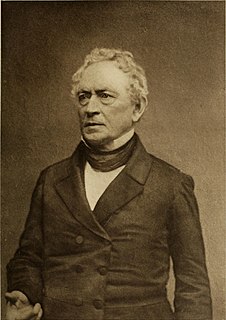A Quote by Ralph Waldo Emerson
The moment the doctrine of the immortality is separately taught, man is already fallen. In the flowing of love, in the adoration of humility, there is no question of continuance. No inspired man ever asks this question, or condescends to these evidences. For the soul is true to itself, and the man in whom it is shed abroad cannot wander from the present, which is infinite, to a future which would be finite.
Related Quotes
If our supreme value is the development of the Western tradition - of a man for whom the highest thing in life is man, for whom love for man, respect for man, and the dignity of man, are supreme values - then we cannot ask the question that says, "if it is better for our survival, might we drop these values?"
If a man, holding a belief which he was taught in childhood or persuaded of afterwards, keeps down and pushes away any doubts which arise about it in his mind, purposely avoids the reading of books and the company of men that call in question or discuss it, and regards as impious those questions which cannot easily be asked without disturbing it - the life of that man is one long sin against mankind.
One of man's important mistakes, one which must be remembered, is his illusion in regard to his I. Man such as we know him, the 'man-machine,' the man who cannot 'do,' and with whom and through whom everything 'happens,' cannot have a permanent and single I. His I changes as quickly as his thoughts, feelings and moods, and he makes a profound mistake in considering himself always one and the same person; in reality he is always a different person, not the one he was a moment ago.
Technologically, modern man does everything he can do-he functions on this single boundary principle. Modern man, seeing himself as autonomous, with no personal-infinite God who has spoken, has no adequate universal to supply an adequate second boundary condition; and man being fallen is not only finite, but sinful. Thus man's pragmatically made choices have no reference point beyond human egotism. It is dog eat dog, man eat man, man eat nature.
Suicide may also be regarded as an experiment - a question which man puts to Nature, trying to force her to answer. The question is this: What change will death produce in a man's existence and in his insight into the nature of things? It is a clumsy experiment to make; for it involves the destruction of the very consciousness which puts the question and awaits the answer.
There are three points of doctrine the belief of which forms the foundation of all morality. The first is the existence of God; the second is the immortality of the human soul; and the third is a future state of rewards and punishments. Suppose it possible for a man to disbelieve either of these three articles of faith and that man will have no conscience, he will have no other law than that of the tiger or the shark. The laws of man may bind him in chains or may put him to death, but they never can make him wise, virtuous, or happy.
The man who cannot listen to an argument which opposes his views either has a weak position or is a weak defender of it. No opinion that cannot stand discussion or criticism is worth holding. And it has been wisely said that the man who knows only half of any question is worse off than the man who knows nothing of it. He is not only one-sided but his partisanship soon turns him into an intolerant and a fanatic. In general it is true that nothing which cannot stand up under discussion or criticism is worth defending.
Humility, which Burke ranked high among the virtues, is the only effectual restraint upon this congenital vanity; yet our world has nearly forgotten the nature of humility. Submission to the dictates of humility formerly was made palatable to man by the doctrine of grace; that elaborate doctrine has been overwhelmed by modern presumption.
Today I believe that man cannot escape his destiny to create whatever it is we make - jazz, a wooden spoon, or graffiti on the wall. All of these are expressions of man's creativity, proof that man has not yet been destroyed by technology. But are we making things for the people of our epoch or repeating what has been done before? And finally, is the question itself important? We must ask ourselves that. The most important thing is always to doubt the importance of the question.
The Creation speaks a universal language, independent of human speech or human language, multiplied and various as they be. It is an ever-existing original, which every man can read. It cannot be forged; it cannot be counterfeited; it cannot be lost; it cannot be altered; it cannot be suppressed. It does not depend upon the will of man whether it shall be published or not; it publishes itself from one end of the earth to the other. It preaches to all nations and to all worlds; and this Word of God reveals to man all that is necessary for man to know of God.








































